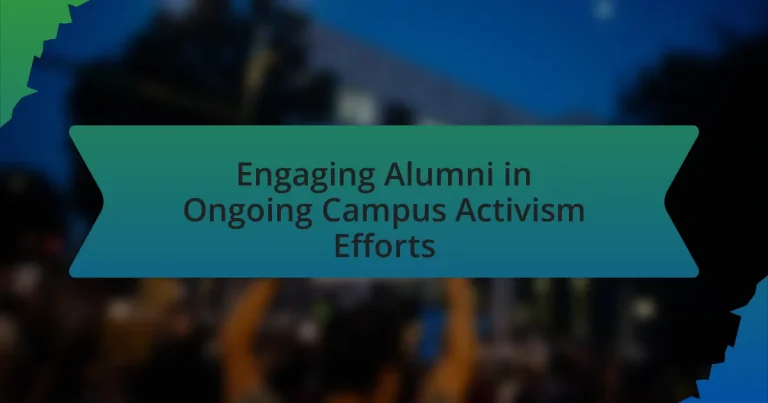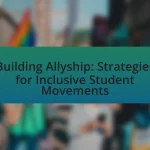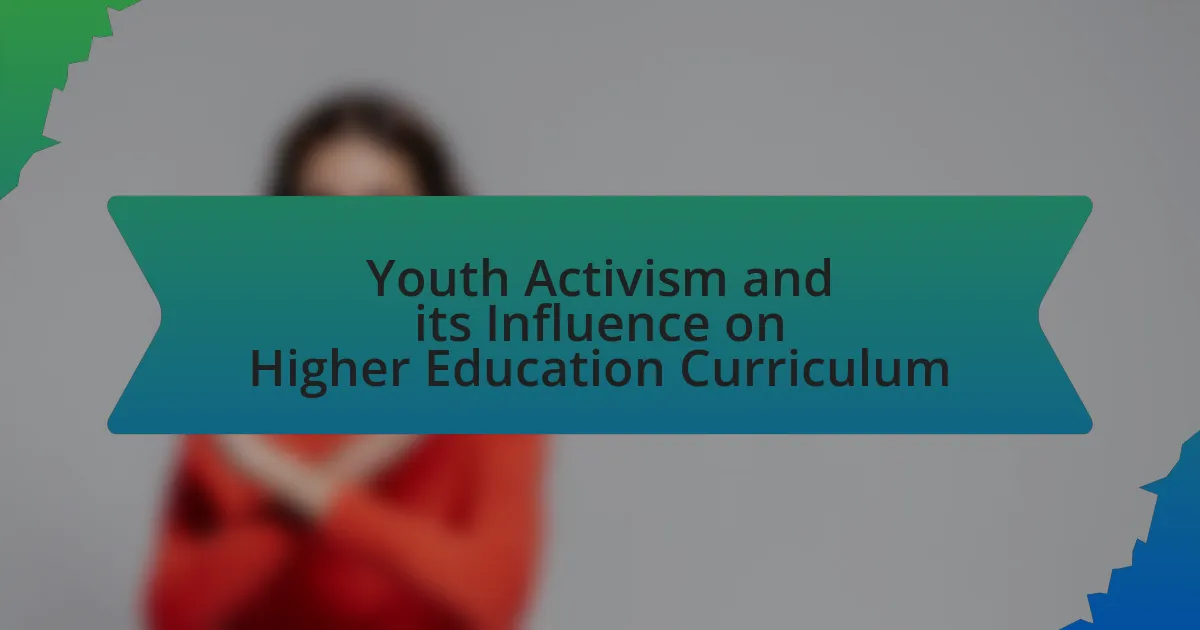Engaging alumni in ongoing campus activism efforts involves creating collaborative relationships between current students and alumni to tackle social, political, and environmental issues within the campus community. Alumni contribute by providing mentorship, financial support, and leveraging their networks to enhance activism initiatives. The article outlines the various roles alumni play, the importance of their engagement, and strategies for effective communication and involvement. It also addresses challenges such as differing priorities and time constraints that may hinder alumni participation, while emphasizing best practices to foster a culture of activism that benefits both students and the institution.
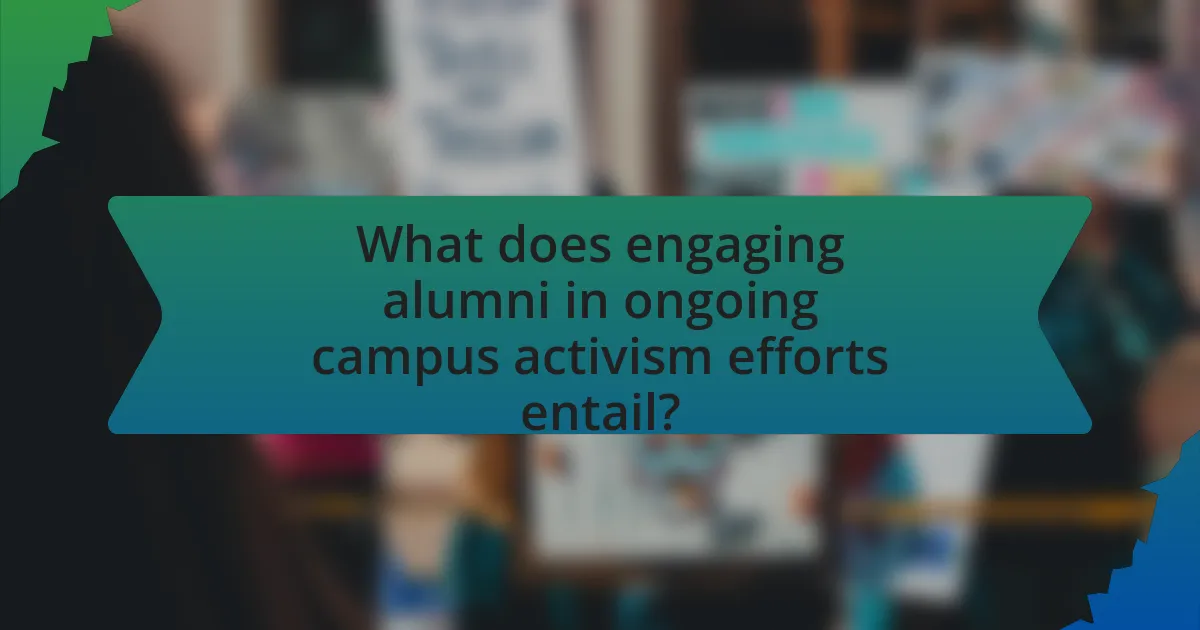
What does engaging alumni in ongoing campus activism efforts entail?
Engaging alumni in ongoing campus activism efforts entails fostering a collaborative relationship between current students and alumni to address social, political, and environmental issues affecting the campus community. This engagement often includes organizing events, workshops, and discussions where alumni can share their experiences and insights, thereby enriching the activism efforts with their knowledge and networks. For instance, alumni can provide mentorship, financial support, or connections to broader advocacy groups, enhancing the impact of the activism initiatives. Research indicates that alumni involvement can significantly increase the effectiveness of campus activism by leveraging their resources and experiences, as seen in various successful campaigns across universities.
How can alumni contribute to campus activism?
Alumni can contribute to campus activism by leveraging their networks, resources, and experiences to support current students and initiatives. They can provide mentorship, share expertise, and mobilize financial support for causes that align with their values. For instance, alumni who have successfully advocated for social justice can guide students in organizing campaigns, while those in influential positions can help amplify student voices through media and public platforms. Additionally, alumni can facilitate connections with organizations that align with campus activism goals, enhancing the impact of student-led efforts.
What roles do alumni typically play in activism initiatives?
Alumni typically serve as advocates, mentors, and financial supporters in activism initiatives. They leverage their networks to amplify causes, provide guidance to current students, and contribute resources to sustain activism efforts. For instance, alumni often organize events or campaigns that raise awareness and funds for social issues, drawing on their professional experiences and connections to enhance the impact of these initiatives. Their involvement can significantly increase visibility and credibility, as seen in various university-led movements where alumni participation has led to greater community engagement and support.
How can alumni leverage their experiences to support current students?
Alumni can leverage their experiences to support current students by offering mentorship, networking opportunities, and sharing industry insights. By serving as mentors, alumni provide guidance based on their own academic and professional journeys, helping students navigate challenges and make informed decisions. Networking opportunities created by alumni can connect students with potential employers or internships, enhancing their career prospects. Additionally, alumni can share relevant industry insights, such as emerging trends and skills in demand, which can inform students’ academic choices and career planning. Studies show that mentorship significantly improves student retention and success rates, highlighting the effectiveness of alumni involvement in supporting current students.
Why is alumni engagement important for campus activism?
Alumni engagement is important for campus activism because it provides essential resources, mentorship, and advocacy that can amplify student-led initiatives. Engaged alumni often contribute financial support, which can fund projects and events that drive activism on campus. Additionally, alumni can leverage their networks to connect current students with influential figures and organizations, enhancing the visibility and impact of activism efforts. Research indicates that alumni who remain connected to their alma mater are more likely to support initiatives that align with their values, thus fostering a culture of activism that benefits both current students and the institution as a whole.
What impact does alumni involvement have on activism outcomes?
Alumni involvement significantly enhances activism outcomes by providing resources, networks, and credibility to initiatives. Engaged alumni often contribute financial support, mentorship, and strategic guidance, which can lead to increased visibility and effectiveness of activism efforts. For instance, a study by the Council for Advancement and Support of Education found that institutions with active alumni networks saw a 30% increase in fundraising for social causes, demonstrating the tangible benefits of alumni participation in activism.
How does alumni engagement enhance the campus community?
Alumni engagement enhances the campus community by fostering connections that support current students and strengthen institutional identity. Engaged alumni often contribute through mentorship programs, providing guidance and networking opportunities that help students navigate their academic and career paths. Additionally, alumni involvement in campus events and initiatives cultivates a sense of belonging and continuity, reinforcing the values and mission of the institution. Research indicates that institutions with active alumni networks experience higher levels of student satisfaction and retention, as alumni serve as role models and advocates for the university.
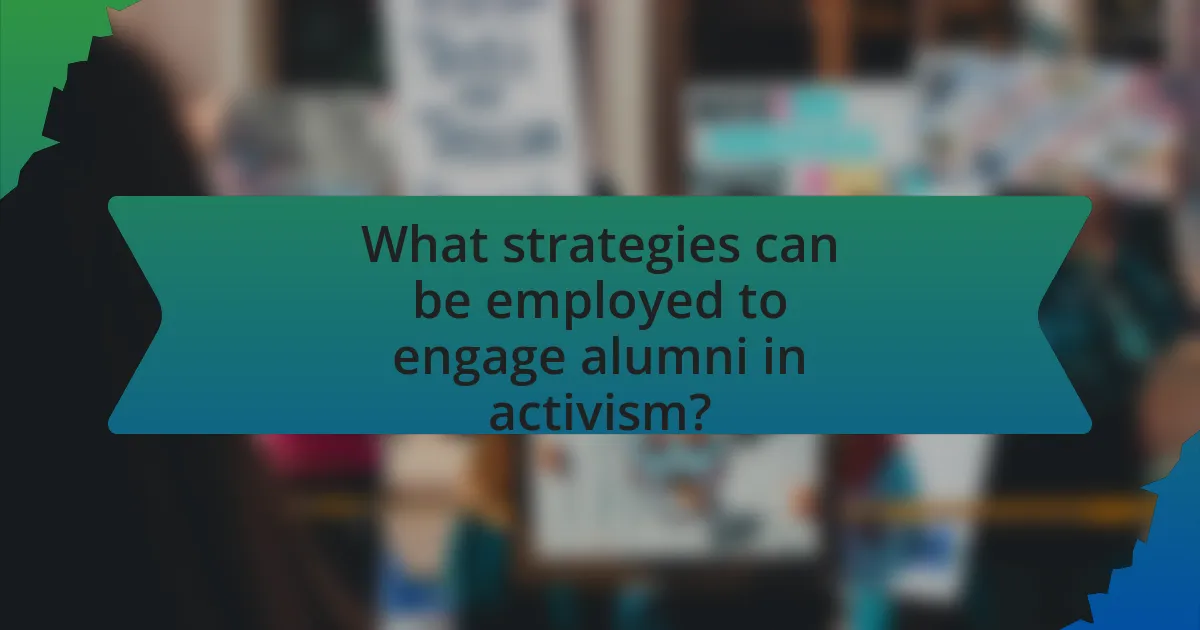
What strategies can be employed to engage alumni in activism?
To engage alumni in activism, institutions can implement targeted communication strategies, create inclusive platforms for involvement, and foster a sense of community. Targeted communication, such as personalized emails and social media outreach, can effectively inform alumni about ongoing initiatives and encourage participation. Creating inclusive platforms, like alumni-led committees or online forums, allows alumni to share their perspectives and contribute to activism efforts. Fostering a sense of community through events, networking opportunities, and recognition of alumni contributions can strengthen their connection to the institution and motivate them to engage in activism. These strategies have been shown to increase alumni participation in various initiatives, as evidenced by successful alumni engagement programs at universities that report higher involvement rates when these methods are employed.
How can universities effectively communicate with alumni?
Universities can effectively communicate with alumni by utilizing a multi-channel approach that includes email newsletters, social media platforms, and dedicated alumni events. This strategy ensures that alumni receive regular updates about campus activities, opportunities for involvement, and networking events. For instance, a study by the Council for Advancement and Support of Education (CASE) found that institutions that engage alumni through personalized communication see a 30% increase in alumni participation in events and donations. By leveraging data analytics to tailor messages and segment alumni based on interests and demographics, universities can enhance engagement and foster a sense of community among alumni.
What channels are most effective for reaching alumni?
Email and social media platforms are the most effective channels for reaching alumni. Research indicates that 73% of alumni prefer receiving updates via email, while platforms like Facebook and LinkedIn are crucial for engagement, with 60% of alumni actively using these networks to connect with their institutions. These channels facilitate direct communication and foster community, making them essential for ongoing campus activism efforts.
How can storytelling be used to inspire alumni participation?
Storytelling can inspire alumni participation by creating emotional connections that resonate with their experiences and values. When institutions share compelling narratives about the impact of alumni contributions, it fosters a sense of belonging and responsibility among graduates. For instance, a study by the Council for Advancement and Support of Education (CASE) found that alumni who engaged with personal stories of current students or faculty were 60% more likely to participate in fundraising efforts. This demonstrates that effective storytelling not only highlights the achievements of alumni but also illustrates the ongoing legacy they can contribute to, thereby motivating them to stay involved with their alma mater.
What types of events can foster alumni involvement in activism?
Alumni involvement in activism can be fostered through events such as workshops, panel discussions, networking events, and community service projects. Workshops provide practical skills and knowledge related to activism, while panel discussions featuring alumni activists can inspire engagement by sharing personal experiences and strategies. Networking events create opportunities for alumni to connect with current students and like-minded individuals, enhancing collaboration on activism initiatives. Community service projects allow alumni to actively participate in causes they care about, reinforcing their commitment to social change. Research indicates that alumni who engage in these types of events are more likely to remain involved in activism, as they build relationships and gain insights that motivate continued participation.
How can workshops and seminars be designed to engage alumni?
Workshops and seminars can be designed to engage alumni by incorporating interactive elements, relevant topics, and networking opportunities. Interactive elements, such as group discussions and hands-on activities, foster participation and create a sense of community among alumni. Relevant topics, particularly those that align with alumni interests and current trends in their fields, ensure that the content resonates and encourages attendance. Networking opportunities, including time for alumni to connect with each other and with current students or faculty, enhance the value of the event and promote ongoing relationships. Research indicates that alumni are more likely to engage when they perceive direct benefits, such as professional development or personal growth, from attending these events.
What role do social events play in building alumni networks for activism?
Social events play a crucial role in building alumni networks for activism by fostering connections and facilitating collaboration among former students. These gatherings provide a platform for alumni to share experiences, discuss social issues, and mobilize collective action. Research indicates that alumni who participate in social events are more likely to engage in activism, as these interactions create a sense of community and shared purpose. For instance, a study by the Council for Advancement and Support of Education found that alumni who attended networking events reported a 30% increase in their involvement in social causes compared to those who did not participate. This demonstrates that social events are instrumental in strengthening alumni ties and enhancing their commitment to activism.
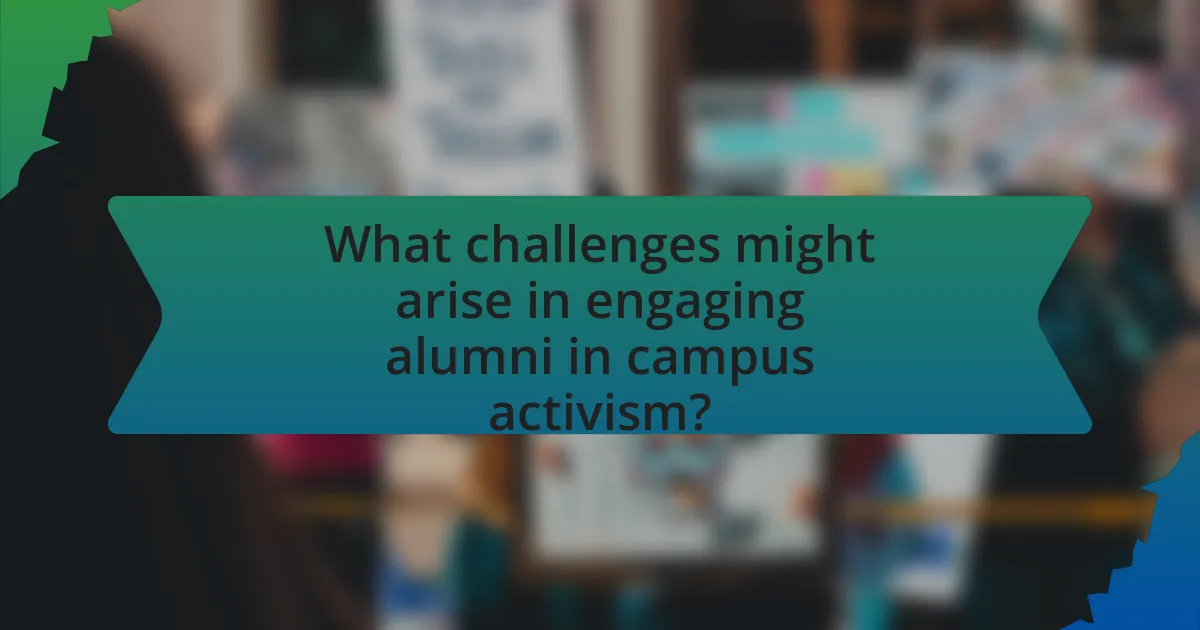
What challenges might arise in engaging alumni in campus activism?
Engaging alumni in campus activism may face challenges such as differing priorities, generational gaps, and lack of awareness about current issues. Alumni often have established careers and personal commitments that may lead them to prioritize professional or family responsibilities over campus-related activism. Additionally, generational differences can result in varying perspectives on activism methods and issues, making it difficult to align alumni with current student initiatives. Furthermore, many alumni may not be fully informed about ongoing campus issues, which can hinder their willingness to participate. These factors collectively create barriers to effective alumni engagement in campus activism.
How can universities address alumni apathy towards activism?
Universities can address alumni apathy towards activism by creating targeted engagement programs that foster a sense of community and shared purpose. These programs can include regular communication through newsletters highlighting ongoing activism efforts, opportunities for alumni to participate in events, and platforms for alumni to share their experiences and insights. Research indicates that alumni who feel connected to their alma mater are more likely to engage in activism; for instance, a study by the Council for Advancement and Support of Education found that 70% of engaged alumni participated in volunteer activities related to their university. By leveraging social media and organizing alumni-led initiatives, universities can cultivate a culture of activism that resonates with alumni, encouraging them to contribute their time and resources.
What strategies can combat the perception of disconnection among alumni?
To combat the perception of disconnection among alumni, institutions should implement targeted communication strategies, such as personalized outreach and regular updates on campus developments. Personalized outreach, including tailored emails and invitations to events, fosters a sense of belonging and connection. Regular updates, such as newsletters highlighting alumni achievements and campus initiatives, keep alumni informed and engaged. Research indicates that alumni who receive consistent communication are more likely to feel connected to their alma mater, as evidenced by a study from the Council for Advancement and Support of Education, which found that 70% of engaged alumni reported feeling a strong connection to their institution.
How can universities create a sense of urgency for alumni involvement?
Universities can create a sense of urgency for alumni involvement by highlighting immediate needs and opportunities for engagement that directly impact current students and the institution’s future. For instance, universities can communicate specific funding goals for scholarships or programs that require urgent financial support, thereby making alumni feel their contributions are critical at that moment. Additionally, sharing success stories of recent alumni who have made significant impacts through their involvement can motivate others to act quickly. Research indicates that targeted communication strategies, such as personalized outreach and time-sensitive campaigns, can effectively increase alumni participation rates, as evidenced by a study from the Council for Advancement and Support of Education, which found that urgency-driven appeals led to a 30% increase in alumni donations within a specified timeframe.
What barriers exist for alumni participation in activism efforts?
Barriers to alumni participation in activism efforts include lack of awareness, time constraints, and differing priorities. Many alumni may not be informed about ongoing activism initiatives due to insufficient communication from their alma maters. Additionally, alumni often face time limitations due to professional and personal commitments, making it challenging to engage in activism. Furthermore, as alumni progress in their careers and lives, their priorities may shift away from campus issues, leading to decreased involvement in activism efforts. These factors collectively hinder alumni from actively participating in advocacy and activism related to their former institutions.
How do time constraints affect alumni engagement?
Time constraints significantly reduce alumni engagement by limiting their availability to participate in events and initiatives. When alumni face tight schedules due to work or personal commitments, they are less likely to attend reunions, volunteer opportunities, or contribute to fundraising efforts. Research indicates that alumni who perceive a lack of time are 50% less likely to engage with their alma mater compared to those who feel they have adequate time to participate. This disconnect can hinder the development of a strong alumni network and diminish the overall impact of alumni contributions to campus activism efforts.
What financial considerations might limit alumni involvement?
Financial considerations that might limit alumni involvement include the burden of student loan debt, which affects many graduates’ disposable income and willingness to contribute financially to their alma mater. According to the Federal Reserve, as of 2021, student loan debt in the United States exceeded $1.7 trillion, impacting graduates’ financial stability and their capacity to engage in alumni activities. Additionally, economic downturns can lead to job insecurity, further reducing alumni’s ability to participate in fundraising or volunteer efforts. These financial pressures create barriers to sustained alumni engagement in campus activism initiatives.
What best practices can enhance alumni engagement in campus activism?
To enhance alumni engagement in campus activism, institutions should implement targeted communication strategies that foster a sense of community and shared purpose. Regular updates about campus initiatives, opportunities for involvement, and success stories can motivate alumni to participate actively. Research indicates that alumni who receive personalized outreach are 50% more likely to engage in campus activities compared to those who do not. Additionally, creating platforms for alumni to share their experiences and insights can strengthen connections and encourage collaborative activism efforts.
How can feedback from alumni improve future activism initiatives?
Feedback from alumni can enhance future activism initiatives by providing insights based on their experiences and outcomes from previous efforts. Alumni can share what strategies were effective or ineffective, allowing current activists to refine their approaches. For instance, a study by the American Council on Education found that alumni engagement in activism leads to increased participation and resource mobilization, demonstrating that their feedback can directly influence the success of initiatives. By incorporating alumni perspectives, organizations can better align their goals with the needs of the community, ultimately leading to more impactful activism.
What role does recognition play in motivating alumni to participate?
Recognition significantly motivates alumni to participate in campus activities by fostering a sense of belonging and appreciation. When alumni receive acknowledgment for their contributions, it reinforces their connection to the institution and encourages ongoing engagement. Research indicates that alumni who feel recognized are more likely to contribute time, resources, and support to their alma mater, as evidenced by a study from the Council for Advancement and Support of Education, which found that 70% of alumni cited recognition as a key factor in their willingness to participate in alumni events and initiatives. This correlation highlights the importance of recognition in enhancing alumni involvement and sustaining their commitment to campus activism efforts.
